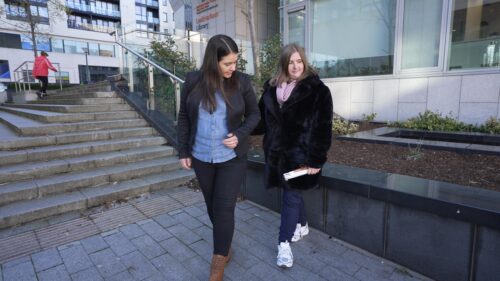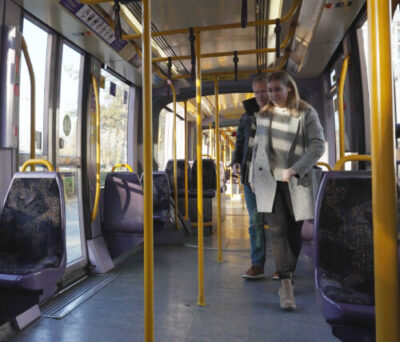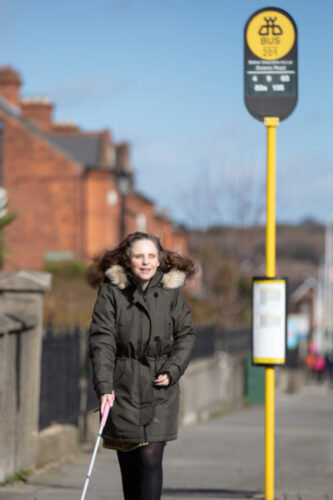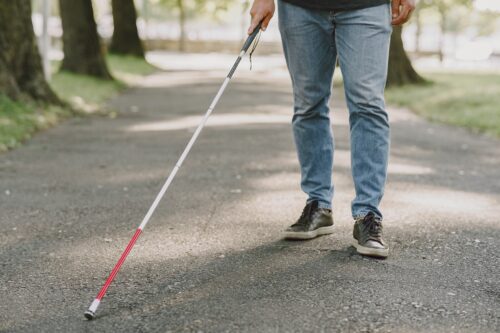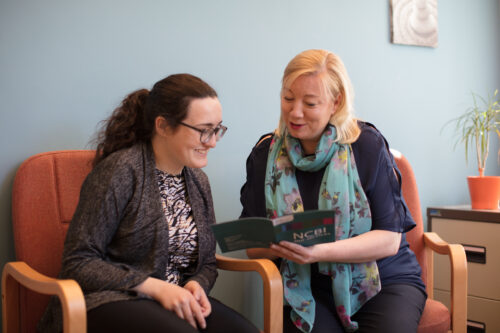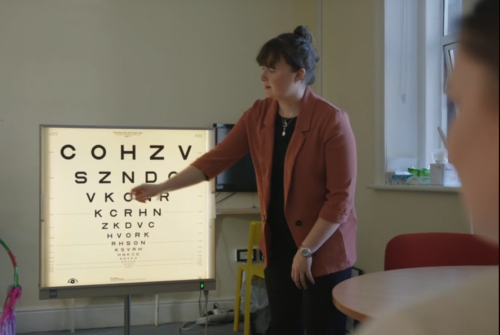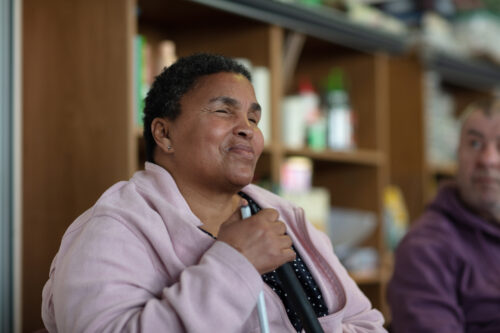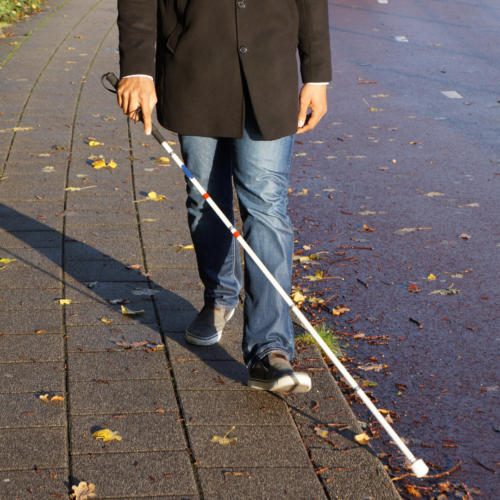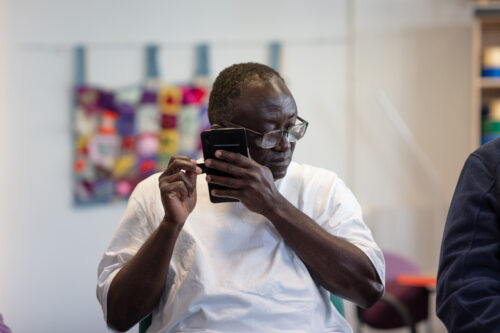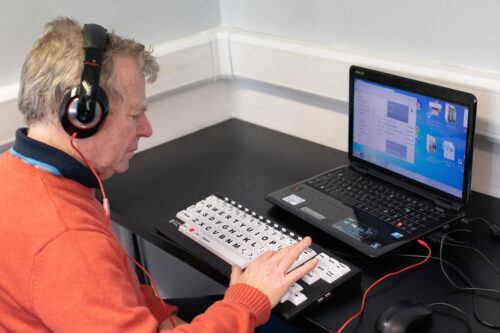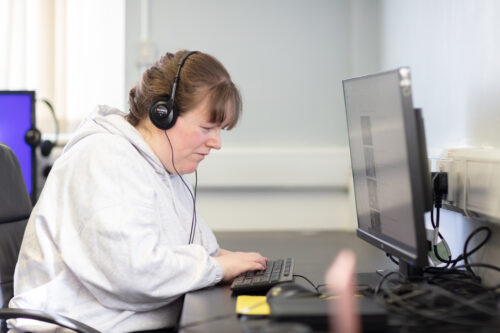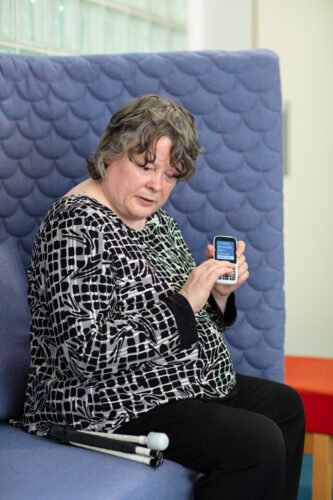1. Public Transport
Accessible signage and audio announcements
- Accessible information is a key component of journey planning for people who are blind or vision impaired.
- Vision Ireland emphasizes that all public transport providers must ensure timely, reliable, audible, and accurate announcements are in operation at all times on public transport.
- These announcements should let passengers know the direction of travel, the name of the next station, and any relevant location-specific information.
- It is essential that the service includes accessible, large print signage to assist people who are blind or vision impaired, as well as ensuring live travel information screens are present and in operation.
- Travel information, ticket booking, and timetables must all be available online and on mobile apps. These websites and apps must meet international accessibility guidelines to ensure they are compatible with any assistive technology that may be used.
Rural & Urban transport
- The UN Convention on the Rights of Persons with Disabilities (UNCRPD) signed by Ireland, supports the right of people with disabilities to travel independently.
- Vision Ireland continues to argue that people who are living with sight loss, regardless of their location, should have access to suitable public transport to support independent living.
- These services should support a person living with sight loss to access essential services, such as education and employment, and access to wider amenities that can have a positive impact on their health and well-being such as local parks, walking trails, and public spaces for socializing.
2. Health
ECLO
- Vision Ireland recognizes the urgent need for prompt access to early diagnosis and support with adapting to a life-changing condition,
- Vision Ireland introduced Eye Clinic Liaison Officers (ECLOs) in 2019. ECLOs are presently based in Dublin and Cork hospitals. They provide vital practical information and emotional support for patients from the point of diagnosis onwards as well as signposting to community rehabilitation services.
- ECLOs support clinicians by giving the ophthalmologist teams more time to focus on providing people who are blind or visually impaired with the necessary support needed.
- Vision Ireland is calling on Government to invest €490,000 annually to ensure the essential ECLO service is available to people living with sight loss all around Ireland.
Waiting Lists
- Vision Ireland continues to highlight that long waiting lists for ophthalmology appointments can result in people with sight loss experiencing a deterioration in their condition. Some may even experience irreversible damage to their vision while on a waiting list.
- In Feb 2023, 37,829 adults and children were waiting for an outpatient ophthalmology appointment, of these 8,639 have been waiting over 18 months.
- Recruitment of more ophthalmologists is needed and these recruitments should be targeted based on need within each Community Healthcare Organisation (CHO) as the length of time someone is waiting on ophthalmology care varies across each CHO area.
3. Social Protection
Green Paper on Disability Reform: A Public Consultation to Reform Disability Payments in Ireland
The Dept. of Social Protection has prepared a Green Paper which outlines proposals for changes to the payment of disability benefits in Ireland. This includes:
1. Disability Allowance
2. Invalidity Pension
3. Blind Pension
4. Partial Capacity Benefit
5. Domiciliary Care Allowance
Vision Ireland is currently preparing a response to this Green Paper and would welcome your feedback. It is important to have your voice heard, so, if you have any comments on these proposals, please email [email protected] before the close of business on 29th February 2024.
You can find full details of the Green Paper by clicking this link.
Cost of Disability Report Impact on Social Welfare Supports
- The Department of Social Protection published the Cost of Disability Report in Ireland (2021) which detailed the additional costs that would impact the cost of living with a disability such as mobility, transport, communications, care and assistance services, equipment, aids, appliances, and medicines.
- Vision Ireland has called on the Government to increase the basic social welfare rate for the Blind Pension and Disability Allowance by recognizing these additional costs. The Cost of Disability Report for people living with sight loss states this cost is €10,997 to €13,609 per annum. This highlights the urgent need for the Government to address this.
4. Employment
Hybrid working / self employment
- The Covid19 pandemic has led to hybrid and remote working opportunities being more common. Having this flexibility is appealing to people who are blind or vision impaired especially when poor public transport prevents them from applying for roles.
- Supports such as digital assistive technology must be available to those working from home as well as those who are office based.
- For those seeking self employment, a package of tailored sector specific support should be available for those seeking to start their own business.
Person-centred Payment
- Vision Ireland urges the Government to publish its review of the HSE Technical Aids Grant and the Department of Social Protection’s Reasonable Accommodation Fund to standardise, modernise and expand how supports are offered. This would decrease the current regional variations that exist.
- Also Vision Ireland recommends the shift away from employer led supports towards the introduction of a Personal Employment Grant which would employees to apply for and subsequently retain their assistive equipment throughout their career whether they work remotely or not.
5. Digital Accessibility
Online applications for Social Welfare Payment
- The Department of Social Protection is still very paper based, expecting paper-based application forms to be completed when requesting payments including Blind Pension or Disability Allowance. This can be a difficult process for people with sight loss.
- The Department of Social Protection website is not compliant with the EU Web Accessibility Directive. But Vision Ireland urges a move to an accessible electronic application system alongside the paper-based system, similar to the electronic applications that were introduced for those applying for the Pandemic Unemployment Payment.
EU Web Accessibility Directive
- Vision Ireland believes that technology is a huge enabler for people living with sight loss. Using a smart phone or the internet on PC / ipad or having specific assistive technology can enhance independence, for example, to book tickets for transport or concerts, apply for a job, to read information and documents, navigate their way safely in public areas etc.
- However, the digital world is not fully accessible which places people who are blind or vision impaired at a distinct disadvantage. The EU Web Accessibility Directive, mandatory since 2020, places a legal duty all public sector bodies to have their websites and apps fully accessible. However, many are still not in full compliance with the legislation. Vision Ireland has called for a Digital Accessibility fund to be created to allow Government Departments, State Agencies, schools, and hospitals to update their websites so they are fully accessible.
- This law will extend to all private sector service providers in 2025 through the implementation of the European Accessibility Act.
Submissions and Position Papers
The Advocacy Team regularly makes submissions to various public consultations, lobbying for the needs of those who are blind or vision impaired.
Some of the recent consultations we’ve responded to include:
-
- Vision Ireland Pre-Budget 2024 Submission PDF
- Vision Ireland Submission_EPSEN Act 2004
- European Disability Card Submission
- DSP Strategy Statement 2023 – 2026
- Housing Adaptation Grant submission
- Small Public Services Vehicles Fines Submission
- Vision Ireland Pre-Budget 2023 Submission PDF June 2022
- Vision Ireland Submission to Joint Oireachtas Committee Disability Matters Oct 2021
- Vision Ireland Submission to the HEA National Plan for Equity of Access to Higher Education (2022-2026)
- Joint Oireachtas Ctte on Health submission Vision Ireland
- Submission to Strategy Statement of An Garda Siochana
- Vision Ireland Response to Draft State Report on UNCRPD
- National Transport Authority consultation process on the Transport Strategy for the Greater Dublin Area: 2016 – 2035
- Public Consultation on Adult Literacy, Numeracy and Digital Literacy Strategy.
- National Transport Authority public consultation on Core Bus Corridors (Bus Priority & Cycle Lanes / Tracks)
Vision Ireland Position Papers
-
- Equitable education: Challenges for children and young people who are blind or vision impaired across the education system in Ireland PDF May 2022
- E-scooter Final Position Paper Feb 22 PDF
- Disabled Drivers and Disabled Passengers Scheme Position Paper
- Electoral Reform Position Paper
- Census Accessibility Position Paper
- Seeing Your Career Report: Identifying challenges and solutions to improve employment rate among people who are blind or vision impaired Oct 2021
- Oireachtas 2019 PDF Oireachtas Briefing: Oireachtas Briefing 2019 outlines our key asks for each relevant government department.
- MESL – Executive Summary PDF Minimum Essential Standard of Living: Research carried out by Vision Ireland and the Vincentian Partnership for Social Justice in 2016 found the Minimum Essential Standard of Living (MESL) for a single adult with vision impairment costs more on a weekly basis. These findings still influence our policy recommendations to ensure income adequacy for people who are blind or vision impaired.
-
-
-
-
-
-
- For best results please do not open PDFs in your browser.
- Please save PDF to your device and open it with Acrobat Reader
-
-
-
-
-
